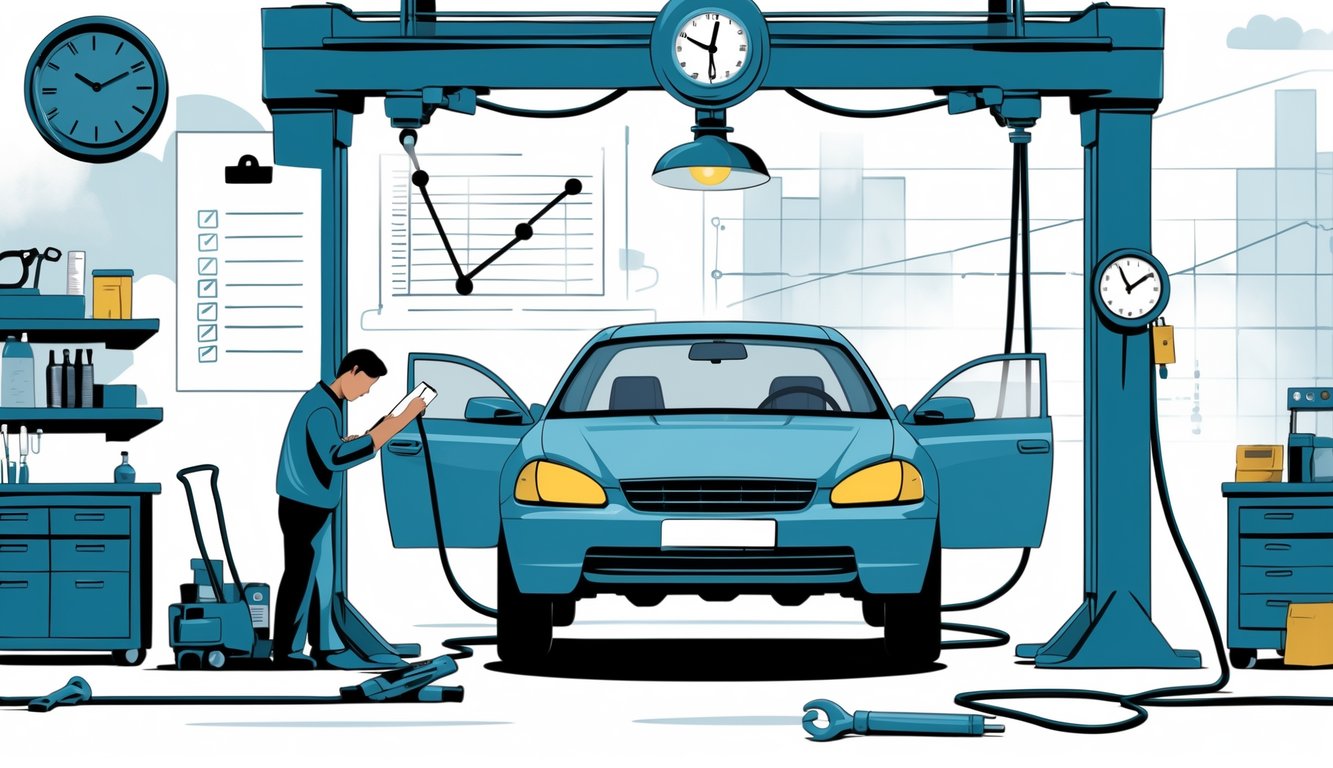
Misbeliefs About Car Service Intervals
I was digging for my jacket and it hit me—everyone disagrees about oil changes. The sticker on my windshield says one thing, the manual says another. Not just oil—transmission fluid, tune-ups, all that stuff sparks arguments at every family dinner.
How Often Do You Really Need an Oil Change?
Supposed to change oil every 3,000 miles, right? But then I actually checked the manual (next to a pizza coupon, naturally) and saw 7,500 miles. My neighbor still insists on the old schedule, but synthetic oil isn’t the same as the cheap stuff from the ‘90s. Old advice just hangs around because the quick-lube guy said so.
I keep meaning to make this a sticker:
| Oil Type | Typical Interval | Why It Matters |
|---|---|---|
| Conventional | 3,000-5,000 miles | Older engines, cheap oil |
| Synthetic Blend | 5,000-7,500 miles | Modern engines |
| Full Synthetic | 7,500-10,000 miles (or more) | Cleaner, lasts longer |
Newer cars can wait longer between oil changes—unless you’re hauling trailers or pretending you’re in Fast & Furious. Occasionally the “change oil soon” light pops up and I just ignore it for a while. Should I? Don’t know. Feels wrong, but whatever.
Understanding Transmission Fluid Changes
Nobody told me transmissions don’t fix themselves. For years, I had no clue what color the fluid should be. There’s this myth that you never need to change it—like, ever. But if you skip it, shifting gets weird and you’re suddenly Googling “transmission noises.” Depends if you’ve got an automatic, manual, or one of those humming CVTs. Manuals are more forgiving, automatics need more attention. Check the color—should be red, not brown or smelling like burnt popcorn. Last time I checked the manual, the interval seemed random, but 30,000 to 60,000 miles is what I see most. Oh, and don’t keep your coffee and transmission fluid bottles together—just don’t.
Don’t buy the “lifetime fluid” line. Lifetime of what, exactly? My patience? The car’s warranty? Who knows.
Are Frequent Tune-Ups Necessary?
I thought “tune-up” meant spark plugs and maybe a motivational speech to the engine. Shops toss the word around like “artisan” at the cheese counter. Most new cars handle timing and fuel mix on their own. I scared myself reading old forums about annual tune-ups.
Here’s what I scribbled under a banana-shaped fridge magnet:
- Spark Plugs: 60,000–100,000 miles for most new engines
- Air Filter: 15,000–30,000 miles, or after allergy season if you have pets
- Fuel Filter: Every 2–5 years, unless your car coughs when you hit the gas
I barely notice a difference after most tune-ups, except that one time my car stopped stalling at red lights. A lot of “required” tune-ups feel like busywork. Still, sometimes I do them just to justify owning a toolbox.
Fuel Efficiency and Additive Misconceptions
Nobody warns you that car ownership is just a parade of small, dumb mistakes that bleed your wallet. I mean, I thought fuel economy was just about picking the right gas, maybe tossing in a bottle of “magic” something from the auto aisle, but nope—turns out, that’s a rabbit hole. Everybody I know has some weird theory, too.
Myths About Fuel Additives and Performance
People are always pitching fuel additives. “Just dump this in, your engine will run like new!” I bought three bottles once—one had a cartoon on it, one was blue, one smelled like nail polish remover. The labels all promised miracles. But honestly, if your car isn’t ancient or running on lawnmower gas, it’s probably fine already. Modern engines practically clean themselves. I watched a buddy pour in two different additives at once (I told him not to), and his car started coughing and stalling, so… not a fan. Maybe ghosts, maybe chemistry, who knows. I get better results just swapping the air filter or doing an oil change.
Here’s what I remember about additives, just off the top of my head:
| Additive Type | Supposed Benefit | Realistic Impact |
|---|---|---|
| Injector cleaner | Restores performance | Pretty much pointless in newer cars |
| Octane booster | More power | Only helps if you’re using the wrong gas |
| “All-in-one” treatments | Fixes everything | Usually a waste |
If it comes in a tiny bottle and smells like paint thinner, it’s probably not doing much.
